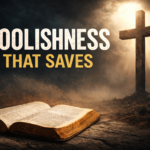“Mystery Leads to Majesty” – John 3:1-17
Introduction: Unraveled mysteries
Sometimes our perspective limits our ability to perceive things as they are. That leaves a lot of things as rather mysterious. Sometimes discoveries free us to perceive things as they are, to understand, and to conclude “Of course, that’s the way things are.”
Before 1492, people believed they lived on a flat earth, and that if you sailed far enough you’d go over some mysterious edge into oblivion. Christopher Columbus’ famous journey across the Atlantic Ocean helped people understand the fuller scope of the earth’s shape as a sphere, it opened humanity’s eyes, and all of a sudden there’s not so much mystery any more.
Before 1543, people believed that the earth was the center of the solar system and that the sun revolved around the earth – that’s why we still talk about the sun coming up in the morning and going down in the evening – it’s a remnant of that belief system. But in 1543, Nicolaus Copernicus proposed the sun as the centre of the solar system, rather than the earth. He explained that the sun doesn’t go around the earth. Rather the recently understood spherical earth spins as it travels around the sun allowing us to enter into sunlight every morning and to be hid from that sunlight every night. That discovery took away some of the mystery of our solar system.
coming up in the morning and going down in the evening – it’s a remnant of that belief system. But in 1543, Nicolaus Copernicus proposed the sun as the centre of the solar system, rather than the earth. He explained that the sun doesn’t go around the earth. Rather the recently understood spherical earth spins as it travels around the sun allowing us to enter into sunlight every morning and to be hid from that sunlight every night. That discovery took away some of the mystery of our solar system.
Some other things that have unraveled mysteries for us are:
Archaeological discoveries that help us understand the history and development of the world in which we live.
Airplane and then space flight that help us see our world and our planet from a different perspective.
Medical research that helps us understand the human body and how it functions, and how it heals, and what is necessary to combat a pesky corona virus.
Every one of those advancements reduces the mystery of the world around us. We can understand and appreciate and explain why things are the way they are. There are still some mysteries left out there for us humans to ponder… like, are there aliens from other planets, and is there a cure for cancer, and whatever happened to the Old Testament Ark of the Covenant?
1. The more we understand, the less we believe
But the trouble with all that is… the more we understand, the less we believe. In Bible times, physical healing from a sickness was generally credited to God rather than doctors and medicine. God was the one who made the sun appear every morning, and that God-appointed sunshine caused plants to grow for our nourishment. God was the one who directed the affairs of the nations and the lives of individuals. The more we understand about the world, the less we seem to believe in God, the less we attribute to God, and the more we put God in a box so that we can understand and explain Him, too… oh, and keep Him there in that box so that He doesn’t do things that we don’t expect or understand or want. When we attribute everything to science or to the laws of nature or to evolution… then we lose some of the mystery of life, and we lose the need for faith.
2. Nicodemus and Jesus – “born again” mystery
In our Gospel reading from John 3, a Pharisee named Nicodemus had a conversation with Jesus about Jesus’ teachings and His miraculous – we might even say, mysterious – signs. (For instance, in John chapter 2, Jesus had miraculously and mysteriously changed water into wine at the wedding in Cana. Nobody tried to explain it, and I don’t think anyone still today could explain it… it was a mystery, a miracle.) Nicodemus wanted to understand this Jesus. During the conversation, Jesus said, “If you want to see the Kingdom of God, if you want to be part of the Kingdom of God, you must be born again.”
Nicodemus didn’t understand “being born again.” There was mystery in that phrase, in what Jesus said. It called for belief, rather than a rational, logical explanation. A logical explanation is where Nicodemus’ mind naturally went – being born again means a man entering his mother’s womb a second time, and that just wasn’t possible! But Jesus was talking about something mysterious and spiritual and inexplicable – how the Holy Spirit blows mysteriously like the wind to lead a person to faith and to Baptism and to the Kingdom of God.
3. Mysteries of God
This Trinity Sunday is about not understanding God, not explaining Him, not putting Him into a box, but rather leaving Him as a mystery. One of the questions we tend to ask about God is how – like how did God part the Red Sea – or why – like why did God ask Abraham to sacrifice his only son, his only beloved son – when in reality we must often leave the how and the why in the realm of mystery – the mystery of God’s nature, the mystery of God’s character, the mystery of God’s purposes, the mystery of God’s actions. Just because there is something mysterious about God doesn’t make Him any less real. There is something mysterious about cancer – how do people get it, why do some get it but not others – but cancer is certainly real.
Some of the other mysteries of God include: why or how does the water of Baptism wash away our sins and make us part of God’s family, and how are Jesus’ body and blood brought to us in the bread and wine of Holy Communion? Don’t ask me to explain those things… I will fail.
When we have to understand everything, we lose the mystery of God, and when we lose the mystery of God, we lose our standards for living, our purpose for life, and our worship of this divine being because… well, because we think we understand everything about Him, and He is no longer holy, and wonderful, and awe-inspiring.
4. Keeping the mysteries of God
a. Standards for living
When we have to understand everything and lose the mystery of God, we lose our standards for living. Imagine a conversation between two ten-year old boys.
“That’s a really nice model airplane you’ve got,” says one.
“I stole it,” says the other. “Do you think that was wrong?”
“Of course that’s wrong… it belongs to someone else.”
“It may be wrong for you, but it’s not wrong for me. I didn’t hurt anyone when I stole the plane. The owner is rich. I’m not. He can afford to buy another one. I can’t.”
You see, if there is no good – no God – behind the world, then how do we define good within the world? If the majority opinion determines right and wrong, what happens when the majority is wrong? What do you say to the woman who abandons her husband and three young children just because she needs to find herself? What do you say about the teenage boy who says to his pregnant girlfriend, “If you have the baby, it’s all your responsibility.”? What do you say about a scammer who deceives a retiree to hand over most of his savings, because he did it willingly? What do you say about Hitler’s boast on a plaque in Auschwitz, “I freed Germany from the stupid and degrading fallacies of conscience and morality.”?
With no conscience, no morality, no sense of right and wrong, we lose our standards for living in society. On the other hand, when we recognize that God is mysterious and holy and different from us, we can accept that when He says “Honour your father and mother,” (and by extension, your governing authorities) or when He says “Don’t commit adultery, or abandon your husband” or “Don’t steal (a model airplane),” He isn’t kidding. That is His standard for our lives. He means it for our good, even if we can’t fully understand, even when our sinful heart would like to do just the opposite. The mystery of God offers us our standard for living.
b. Purpose for life
The mystery of God also offers us a purpose for life. Max Lucado imagines a conversation between a lark on a window sill and a canary in a cage.
The lark looks at the canary and asks, “What is your purpose?”
“My purpose is to eat seed.”
“What for?”
“So that I can be strong.”
“What for?”
“So I can sing.”
“What for?”
“When I sing I get more seed.”
“So… you eat in order to be strong so you can sing so you can get seed so you can eat?”
“Yes.”
The lark reflected on that and said, “There is more to you than that. If you’ll follow me I’ll help you find it, but you must leave your cage.”
When we lose the mystery of God, we likewise adopt a cyclical purpose like the canary: “I eat so that I can be strong so that I can work so that I can earn money to buy food so that I can eat.” For so many people in our world, that’s all there is to life. People may seek meaning in a career, or through sports, entertainment, popularity, parties or living vicariously through their kids. But these are all mirages in the desert of purpose. If we don’t acknowledge God, if we don’t perceive and believe in the mystery of God, we are really no more than developed animals, with no identifiable purpose – just to live out our days and years… and die.
Contrast that to God’s vision for your life. Paul wrote in Ephesians 2 – “For we are God’s workmanship, created in Christ Jesus to do good works, which God prepared in advance for us to do.”
In 1989, the Saskatchewan Roughriders – my team – won a very memorable Grey Cup game, capturing the league championship trophy for only the second time in their history. We were living in Winnipeg at the time, and a few months later the trophy and some players found their way to Winnipeg for Rider fans to see. I took my six year old son to see it. We had a polaroid photo taken with the trophy, and with defensive back Richie Hall. What makes the photo special is that Richie Hall signed it. Maybe you have a signed sports jersey or sports card of your favourite player. What makes it extra special is the signature.
There are lots of creatures on this planet that have flesh and hair and bones and blood. We are not just an accident or an incident. What makes us special is the fact that we have God’s signature on our lives. We are His workmanship, Paul wrote. We are significant not because of what we do, but because of who we are. We belong to God. We are His works of art, and we are created in His image to do good deeds. That is our purpose in life. We appreciate the mystery of God, and we present that mystery of God to the people of the world by our Godly character and by our humble works of service and love. We don’t just eat to be strong to sing to get food to eat. With our very lives signed by God, we point others to the truth that Paul expressed in the two verses before Ephesians 2:10. He wrote: “It is by grace you have been saved, through faith – and this is not from yourselves, it is the gift of God – not by works, so that no one can boast.” You are saved! You are forgiven, by God’s grace, through faith in Christ Jesus, who was crucified for you, and who was raised from the dead for your redemption. That’s our purpose in life – by our words and by our deeds to point others to Jesus the Saviour.
c. Worship of God
Finally, as we acknowledge the mystery about God (about the Trinity) it leads us to worship His majesty, His provision, His protection, His salvation/redemption, His love. Jesus made it clear in His conversation with Nicodemus: “God so loved the world (God so loved YOU) that He gave His only Son, that whoever believes in Him should not perish but have eternal life.”
In the Old Testament lesson today, Isaiah got it right. He recognized his own sinfulness – as we all should do, especially our feeble attempts to understand God, and our desire to control God and put Him in a box. Isaiah confessed, and we confess along with him: “Woe is me! I am lost. I am a man of unclean lips.” In contrast, Isaiah perceived and believed in the mystery and the majesty of God as he heard the angels proclaim, “Holy, holy, holy is the Lord of hosts.” – and we might even see in that three-fold “Holy” an awareness on the part of Isaiah of the three-fold nature of God. Isaiah received the forgiveness of his sins as the burning coal touched his lips and the angel said, “Your guilt is taken away, and your sin atoned for.” When God asked who was willing to go and take His message to the world, Isaiah put up his hand and indicated he would accept that assignment, that purpose. And again, the angels’ proclamation was truly worship of God – “the whole earth is full of His glory.”
St. Paul also wrote about the mystery of God that leads us to consider His majesty and to worship Him. Romans 11:33 describes God’s mystery and verse 36 takes us to His majesty. “Oh, the depths of the riches of the wisdom and knowledge of God! How unsearchable His judgements, and His paths beyond tracing out!” Then, “From Him and through Him and to Him are all things. To Him be the glory forever!” Mystery… majesty!
Proverbs 2 leads us into a similar consideration of the mystery of God. It calls on the reader to consider God’s commandments, to seek spiritual wisdom and understanding and insight. “Then,” it says, “you will understand the fear of the Lord and find the knowledge of God.” Bible commentator Derek Kidner calls those two expressions “the poles of awe and intimacy.” Consideration of “the fear of the Lord” will form in you a deeper awareness of the holiness, majesty and splendor of our God. You will be immersed in a sense of awe and wonder, and, like Moses at the burning bush, it will force you to figuratively take your shoes off your feet realizing that when you pray or sing or confess your sins or read God’s Word you are truly standing on holy ground. That’s the pole of awe.
Second, seeking spiritual insight will enrich the closeness of your relationship with this great God – that’s the pole of intimacy. The phrase “the knowledge of God” is not about Biblical trivia – like correctly identifying the nine fruit of the Spirit, or reciting the Bible books in order, or nobly memorizing John 3:16 and ten other power-packed Bible verses. The “knowledge of God” is not merely a cerebral exercise, but rather an actual relationship with God that is personal and experiential and intimate. It’s more like what we read in Psalm 46 – “Be still… and know that I am God.” In the stillness of quiet times – of prayer and Bible reading – come to know God personally, and that relationship will lead to heartfelt worship.
On this Trinity Sunday, if you don’t understand everything about God being three and one… join the club, and don’t worry about it. There are just some things about God that we leave to mystery, to belief. It’s important that we don’t keep God in a box or a cage, but that we allow Him to be mysterious and holy, and to fly around in our world and to blow around in our world like the wind, and to invite us to follow Him and truly see what He is doing, and in that to find our standards for living, our purpose in life, and our worship of Him – God, Father, Son and Holy Spirit. In that Spirit-inspired belief in God’s only Son and in that worship of God’s mystery and majesty you will – as Jesus promised – have eternal life. Thanks be to God. Amen!






